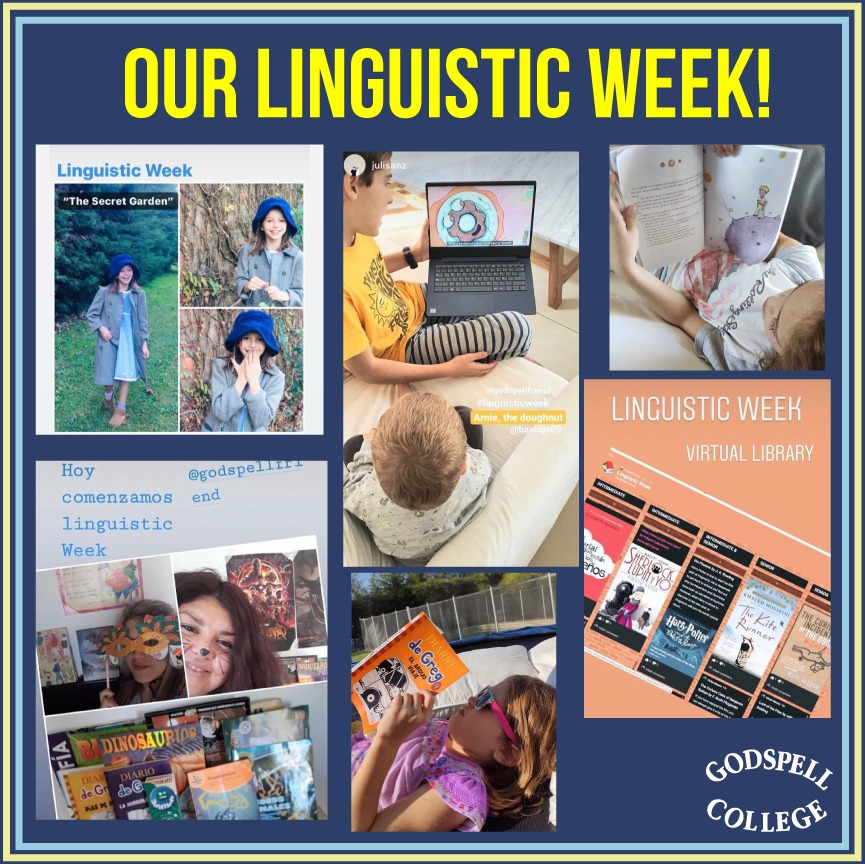Linguistic Week at Godspell College
Posted: 18 December 2020

Overview
Every year we organize a school wide linguistic integrated unit called Linguistic Week. Our Language Net – a group of teachers from across the school – plans ahead and puts together the goals for this activity both for the whole school and across the sections. This is a Spanish-English bilingual project consisting of different activities that engage our whole community for a week during which we focus on promoting in our students a love for reading and an appreciation for literature.
Planning
Collaborative work is present wherever possible at Godspell. That is why every teacher and coordinator belongs to one of our “Nets”. These “Nets” are made up of teachers from across the different school sections that work together on a specific discipline (Arts, Language, Maths, etc). In this case, it was the Language Net who was in charge of planning the Linguistic Week. They had a series of meetings during which they decided which would be the common activities for the Linguistic Week, as well as its duration, participants and goals. Once the calendar was set, it was passed along to the different sections so that each team could add their own specific activities within the general structure.
Details
Unlike some other years in which we chose a general theme (for example: Shakeaspeare), this year we did not specify any other than “Enjoy reading” as a motto. The fact that we were homeschooling at the time that we held this activity faced us with the need to readjust some initiatives and drop others, such as our traditional Book Fair .
The whole week was devoted to promoting literature and linguistic activities and the schedule included diverse initiatives across the school such as:
- Guest speakers: Anybody that wished to participate by reading a book could do so (parents, grandparents, old Godspellers). We published a timetable with the different reading sessions so that everyone could join. We also invited one class per speaker according to their age range to guarantee an audience in each session.
- Speech competition: Every year we hold a speech competition between the different Houses. Virtuality faced us with the need to tweak it this time so we had to adjust to the circumstances. Usually the captains from the senior years go to kinder classes to present their speeches, but this year they recorded it and we shared it on screen. The final competition was done on zoom.
- Virtual library: In spite of the many challenges that the lockdown brought about, we thought we would find a way to take advantage of it and decided it would be a good opportunity to populate our virtual library. So we scanned plenty of books, separated them by subjects, and asked the students to read them aloud via zoom and record it. By the end of the week, we had a considerable number of new ebooks that are now available for the whole school. https://es.padlet.com/solponce23/LinguisticWeek
- Logo Competition: some weeks in advance, we launched a “Logo Competition” inviting students to design their own logo and then we selected one who was finally used in the brochures and flyers.
- RS Collaborations: We also established two collaborations with other Round Square schools during this special week. One was a Book Club for Senior students with 7 schools joining: Andrew’s School for Girls, Daly College, The Punjab School, Wellham Boys, Chittagong Grammar School, Bangalore International and The Shri Ram School.
- The other was a middle school collaboration on the book “James and the Giant Peach” by Roald Dahl. For this initiative we worked together with The Punjab School, Daly College and Bangalore International https://es.padlet.com/vivianmeson/BookClub
- Collaborative Stories: for this project we uploaded the start of a story and the students from Middle and Senior school had to make up the following part taking turns to help finish it.
- Share your reading spot: As a way of staying connected and feeling close, we asked students to upload into a shared platform a picture of their reading spot at home.
Challenges:
Of course operating virtuality was the major challenge around this project. Not only did we face the need to adapt a full week’s programme into zoom sessions and collaborative platforms, but we also had to plan and schedule in advance all of the activities that are usually done in person at school. This meant recording and editing videos and making sure they were all shared properly and in time. Luckily we have procedures from previous years and our staff is trained for these kinds of projects, so that made the task easier.
Impact
The lockdown context in which we were delivering our lessons allowed this project to have a very particular impact: it was a boost of energy for our students as it brought about a change in their daily routines. On the other hand, Godspell students have been developing a love for literature and reading. These are two core skills so students showed great enthusiasm and participated actively in the different proposals.
Learning outcomes
During our Linguistic Week 2020 edition we established the following learning outcomes for our students:
- a) To promote a love for reading.
- b) To enjoy reading.
- c) To express feelings through literature.
- d) To develop linguistic skills.
Long term outcomes
One of the long term outcomes of this activity is to foster in our students a commitment to become critical and free thinkers, so that they will be willing to live in a creative way. Also to engage students, staff and parents as a community and grow in them a sense of belonging through an activity that is both different and amusing. In our experience, these kinds of whole-school involvement projects are the ones that our former students cherish and remember the most.
Advice
- Involve the whole school and your extended community
- Make the most of the global connections that come from being a Round Square school.
- Let children lead and make sure they are involved in every step of the process.
- Allow a time and plan for students self-assessment.
Author: Barbara Maschwitz, Round Square Representative, Godspell College
